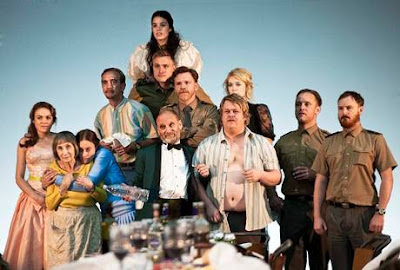'Three Sisters' review or 'A beautiful bunch of forget-me-nots'
'Three
Sisters', Anton Chekhov. A new version by Benedict Andrews
Young
Vic Theatre, Wednesday 26th September
Written
for Culture Wars
Benedict
Andrews' modern version of 'Three Sisters' could've royally pissed me
off. Andrews wrote and directed this production and his stamp is all
over it. There's not a word, sound or visual flourish that hasn't
come from him. It could so easily have felt like one huge ego trip –
only it works. It works really, really well.
We
begin fairly conservatively, although the raised stage has been
stripped bare and weird, brash lighting floods the stage and extends
out into the audience. It all feels very exposed. The three sisters –
weary Olga, moody Masha and dreamy Irina – sit in a triangle
formation around the stage. They approach the stage as they approach
their lives. Olga (Mariah Gale – honest and intriguing as ever)
uses the stage as a desk, Masha (Vanessa Kirby – cruel and
mesmerising) smokes and sulks and Irina (Gala Gordon) tiptoes and
twizzles around the space, willing people to look at her and love
her.
So
far, the production feels clean and the characters vibrant and
elegantly defined. The rest of the troops then file in for Irina's
birthday dinner and the play's themes, quickly and ingeniously, start
to resonate strongly. Although the script feels quite casual, packed
with contemporary allusions and blunt swear words, it's lively and
true to the characters. And, whilst the dialogue feels ever so loose,
the direction is deceptively rigorous, revealing Chekov's concerns
with perfectly considered playfulness.
Vershinin
(William Houston) – who looks like a classic romantic hero and
sounds like hypnotist – picks up on the girls' earlier discussion
about prevailing memories and hopes for the future. He imagines
wiping the board clean and beginning his life anew; 'I'd invent a
radical new existence for myself – in a room like this for
example...' The stage hums with meaning, so clear and so urgent you
almost want to reach out and shake the characters silly; 'Look, here
you are anew! Here you are in our room and you're exactly the same!
What do you make of your wafty philosophising now, old chum?!'
It's
rare to feel so involved in a Chekov play and it's down to Andrews
and his magic, directorial wand. Gradually he allows his stage
business to speak, loudly and clearly, for the play. A gentle stream
of contemporary allusions gradually trickles through the production.
Masha's husband enters wearing jeans. Another chap mentions his
despair at being slumped, uselessly, in front of the TV. These are
not arbitrary attempts at modernising a classic; they are clever
touches that constantly reaffirm the play's obsession with time,
memory and man's futile quest for permanence.
The
gang leaves the table to pose for a photograph; a moment that again
allows Andrews to crystallise Chekov's characters and concerns. As
the girls pose, with varying degrees of confidence, their photo is
taken using a snazzy camera 'from the future'. It feels both hopeful
and sad, stressing that the world will continue to advance and these
characters, no matter how much they desire change, will stay exactly
the same, rooted to the spot by this photograph, by society and by
their own instinctive and immutable natures.
These
ideas, so latent in Chekov's text, continue to build splendidly. In
the second half, following a devastating fire, the sisters discuss
their futures. As they wrangle over a fate that has already been
written for them – already been played out countless times across
the centuries – stage men, dressed as soldiers, silently dismantle
the set between them. The sisters' are blind to the world changing
beneath their very feet.
Interesting,
too, is the audience's reaction to this potentially disruptive stage
business. Initially, as the stage hands enter the stage, one greets
their arrival with hope; is this a new character come to clear up
this mess? But, as that hope is distinguished repeatedly, one starts
to tune out the stage-hands. One learns to ignore their subtle but
absolute overhaul of the stage space, our world for the night. It's a
strange feeling; almost as if we have become one of the characters on
stage, resolutely ignoring or at least unable to change the shifting
landscape in front of us.
The contemporary allusions gather pace. We are shown frequent and disturbing flashes from the future. Brother Andry slopes across the stage in a football kit and his wife, Natasha, bears a nasty resemblance to a WAG. It's doubly depressing, in a play that contains so many characters who long for a better and enlightened future, to see this bleak glimpse from our present. Is this what these characters hoped for? Is this what we call progress? Is this a time we will even want to preserve – or one we might hope to forget?



BTW, this sub-head/second title is brilliant.
ReplyDelete